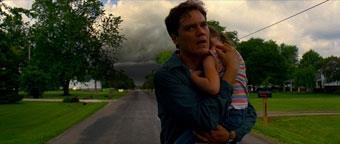Dir/scr: Jeff Nichols. US. 2011. 116 mins

Inner and outer storms combine to impressive effect in Jeff Nichols’ second feature, which plays in Critics’ Week at Cannes after its well-received Sundance premiere. Ostensibly about a mid-western family man’s descent into schizophrenia, this darkly compelling psychological thriller carries a deeper message about the state of mind of middle America, post 9/11, post Guantanamo and post financial meltdown.
The film’s greatest strength though is the way it combines hints that we’re watching a parable of the new US climate of anxiety with an unflinching dedication to the reality of its characters’ plights.
Picked up by Sony Pictures Classics just before Sundance, and pegged for an October domestic release, the film has a much slicker widescreen feel than the director’s debut feature, the gritty indie drama Shotgun Stories, though its slow pacing will alienate the videogame generation.
Emotionally authentic, and often moving, even while it flirts with thriller, horror and disaster-movie genre traits, the film features a riveting lead performance by Michael Shannon as a man struggling to come to terms with the realisation that of the imminent threats to his family that he sees all around him, the biggest may be himself. Awards action for Shannon is not unthinkable; Nichols’s fine original script (marred only by some second-act doldrums) and David Wingo’s sombre, ominous orchestral score also deserve nods.
The success of Black Swan has proved that there is a renewed appetite out there for well-made, intelligent dark films - and Take Shelter will play to a more limited version of the same audience at home and abroad.
Shannon plays Curtis, a solid, taciturn construction worker who lives in a typical blue collar suburban home somewhere in the Ohio tornado belt. With his pretty wife Sam (Chastain) and young deaf-mute daughter Hannah (Stewart), he lives the kind of contended eggs-for-breakfast existence that disaster movies always kick off with, and when Curtis sees a twister on the horizon we initially expect the film to head in this direction.
But Curtis’s storms, it’s soon revealed, are all in his mind, on a par with the increasingly real nightmares he suffers (when the family dog bites him in a dream, his arm hurts all day).
As the visions get worse, Curtis becomes obsessed with the old underground storm shelter in the garden, taking out a risky bank loan to have it extended with the reluctant help of work buddy Dewart (Wigham). At the same time though, he is aware that his mind is playing tricks on him: we learn that his mother was hospitalised with schizophrenia in her early thirties, and in his lumbering, inarticulate way he begins seeking medical help, all the while trying to conceal his affliction from his wife.
A growing sense of dread accumulates, propelled by Curtis’ FX-generated visions of stormclouds, lightning and bird swarms, and underlined by the ominous chords and bass surges of the soundtrack. Even the widescreen format does its bit, seeming not so much a wide-open space as the narrow letterbox through which Curtis views the world.
Perhaps the film’s greatest strength though is the way it combines hints that we’re watching a parable of the new US climate of anxiety with an unflinching dedication to the reality of its characters’ plights. Chastain is good as the film’s emotional touchstone, a mother striving to protect her child but also hold on to the man she loves, and help him to separate hallucination from reality. But it’s Shannon as a man desperate to keep a grip, yet unable to rewire his mind, who really stands out. Rarely has a descent into madness been presented with such disturbing and affecting empathy.
Production company: Low Spark Films
International sales: Film Nation, www.wearefilmnation.com
Domestic distribution: Sony Pictures Classics
Producer: Tyler Davidson
Cinematography: Adam Stone
Production designer: Chad Keith
Editor: Parke Gregg
Music: David Wingo
Main cast: Michael Shannon, Jessica Chastain, Tova Stewart, Shea Wigham





















